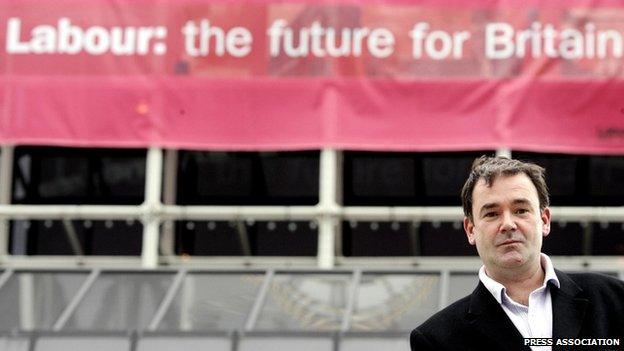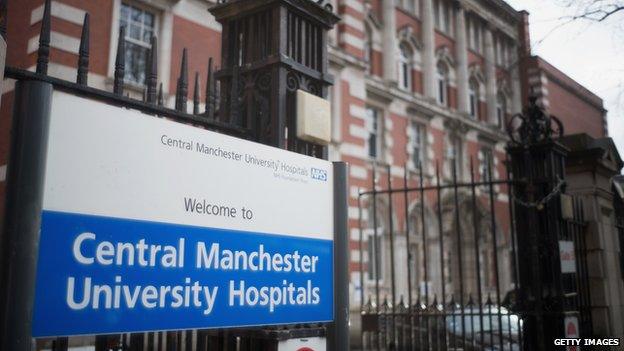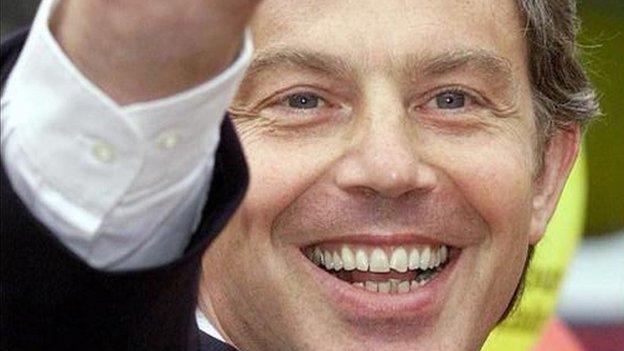Could Blue Labour capture party's soul?
- Published

Jon Cruddas was appointed Labour Party policy co-ordinator by Ed Miliband in 2012
The link between a collection of erudite, philosophical essays, a nasty spat within Labour ranks about the NHS and a top level debate in the party over immigration, may not be obvious.
But it is important.
As veteran Labour MP Frank Field writes, external in Blue Labour, Forging A New Politics: "Blue Labour poses the most fundamental of challenges to the Blairite electoral strategy that, despite changes in personnel, remains in place."
He continues: "Had the leadership given serious thought to Blue Labour, its worry, if not annoyance, would have quickly turned to alarm."
It may, given time, display the level of alarm he thinks is appropriate.
Win or lose the election these ideas will be in play, for in these deep and thoughtful essays I hear the future echo of battles yet to be fought.
Through them runs a steel core, a determination to remake and remodel the Labour Party.
There was a feeling that after Ed Miliband's victory Blue Labour would have the ear of the leadership.
It does - but it is less certain if it has the leader's heart or mind.

Blue Labour
Labour Party pressure group that "aims to put relationships and responsibility at the heart of British politics"
Styles itself as an attempt to blend a "progressive commitment to greater economic equality with a more 'conservative' disposition emphasising personal loyalty, family, community and locality".
Supporters include MPs Jon Cruddas, Tom Watson, Frank Field and David Lammy.
Term was first coined in 2009 by Labour life peer and academic Maurice Glasman, a senior lecturer in Political Theory at London Metropolitan University
Critics on the left of the Labour Party see the movement as an attempt to shift Labour further to the right on social issues. Immigration is a particular flashpoint.

The presence in the shadow cabinet of Blue Labour guru, Jon Cruddas, external is important.
He is also co-ordinator of Labour's Policy Review, and the party's recent tactical policy-making suggests there is still a battle for the strategic vision.
Blue Labour preaches a complex gospel, rooted in Christian socialism, urging greater understanding of Labour's working class roots and lost supporters - and their small 'c' conservatism - while rejecting big state solutions in favour of community co-operation.
It has a strong sense that politics is a struggle between right and wrong, and that love and work are more important than economic reward. These essays abound with religious phrases like "covenant" and "fall and redemption".
Editor Adrian Pabst writes: "Far beyond any other group, Blue Labour has questioned the current consensus at the heart of the Labour Party and British politics - the fusion of social with economic liberalisation under the joint aegis of the central bureaucratic state and the global 'free market'."
This suggestion that Blue Labour stands four square against some of Labour's most sacred beliefs is not just bluster.
Split over NHS
The recent row over the chancellor's plan to give Greater Manchester control of £6bn of NHS money, external has divided the party.
Manchester's Labour MPs are split, external, while most councillors, external in the area are for it, and the shadow health secretary claims it will create a two-tier NHS, external.

Greater Manchester will control a combined NHS and social care budget of £6bn
While this sort of devolution may not be enough for Blue Labour it seems in line with what Cruddas writes in his chapter The Common Good In An Age of Austerity.
He says: "No more top-down reorganisation. Instead, locally run and organised schools, hospitals, house-building programmes and habitats.
"We need to forge co-operative ties with ethical enterprise - such as co-operatives, mutuals, and social businesses.
"Combined local authorities will be given greater control over tax revenues to invest, grow their revenues and fund their own priorities. By decentralising both taxes and services, we can simultaneously get rid of public debt and increase popular power."
Mr Cruddas is one of the more fascinating Labour politicians, as set out in this brilliant article, external.
Frustratingly for journalists like me, he rarely gives interviews, so I don't know what exactly he makes of the Manchester row, but earlier he suggested, external the chancellor had been "agile" and made a "land grab" for Labour policy.
His usual public reticence may increase the respect of colleagues who despair at the sight of big egos promoting themselves, sometimes at the expense of the party.
I don't know him, so could be wide of the mark, but his history suggests he is that rare thing - a politician genuinely more interested in the victory of his ideas than the furtherance of his career.
But the very belief in policy so at odds with the consensus, suggests Blue Labour will not keep its powder dry for ever.
If Labour loses in May it is obvious there will be further soul searching about its meaning and purpose.
But even if it wins it is likely to be by such a small margin that the debate about how to extend its appeal will be urgent.
In government what policies to stress becomes more than academic.
Immigration row
Immigration is another issue where clashes are certain.
Central to Blue Labour is not only the contention that Labour has abandoned its core voters, but that it misunderstands them.
Frank Field insists that many working class voters reject his party because they find its policies "repulsive", rewarding the "social misfit".

Frank Field says some working class voters find Labour policies repulsive
"They do not see Labour as being committed to the flag, ie being proud of the country; as having a clear stand in defending the country's borders, ie they are soft on immigration; or as promoting a welfare state where rewards have to be earned, i.e. they cater largely for the freewheelers, rather than hard-working families."
This raises the suspicion among some of Blue Labour's critics that it summons working class values merely in order to enshrine traditional prejudices as policy.
They claim that this could very easily lead to a much darker hue than blue. Of course that depends what solutions are on offer.
But it points to a paradox - the attempt to appeal to existing, small 'c', working class attitudes towards nation, welfare and immigration within a framework of working class self-help and community solidarity that may no longer exist.
Thought-provoking message
It is indeed a good job that paradox is loved by Blue Labour.
Take the introduction by the former Archbishop of Canterbury Rowan Williams. It is intellectually stimulating, even exciting, challenging what he calls the "cultural muddle" that assumes "the 'starting position' for human identity is a solitary, speechless individual who moves out from primitive isolation to negotiate cautiously with other similar creatures".
He goes on: "We ought to be more than ever alert to the fact that our self-awareness is shaped by the inseparable awareness of other subjects, that projection into the life of the other is there from the start, that how others speak to us, imagine us, nurture or fail to nurture us, is not an 'extra' to our sense of who or what we are but completely woven into the very idea of being a 'self'."
It is thought-provoking stuff, but I doubt it would go down a bomb on the doorstep in Dagenham.
This is indeed this the paradox.
Part of the Blue Labour equation is not strikingly new. Much of the language seems very Blairite.
What is "covenant" but a reincarnation of those aged sound bites "rights and responsibilities" and "tough on crime, tough on the causes of crime"?

Tony Blair used soundbites to great effect
These old Blairisms have a very Blue ring to them.
However, Blair's appeal to Sun readers was pragmatic to the point of cynicism, Blue Labour, acknowledged romantics, seem to want to draw in these highly individualist and atomised voters by re-positioning them as Mirror readers of yesteryear, thirsting for community and social justice.
If this is more than academic meanderings, it is a grand challenge - a desire for acts of summoning, creation and will, that may yet play a big part in the unfolding Labour drama.